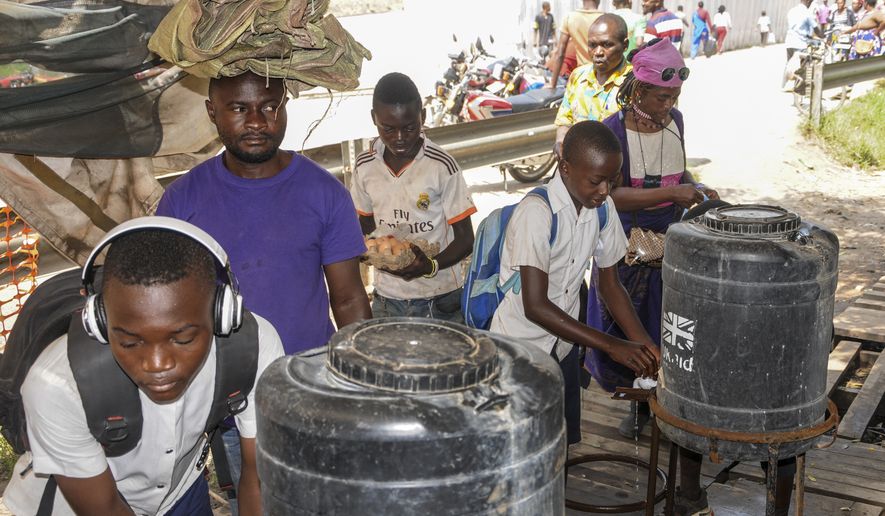KAMPALA, Uganda — Ihandiro Primary School in western Uganda has a new lesson for children that takes priority over reading and math: Wash your hands.
At the entrance to the school, in hallways and in front of classrooms, basins marked in English and multiple other languages emphatically tell children to wash up with soap before going to class.
On the front line in the city of Kasese, the fear of Ebola is palpable. The threat is only 50 miles away, across the border in Congo, where more than 1,600 people have died in what is now the second-largest outbreak of the deadly virus on record. Ebola has proved not to respect national boundaries.
“We are not taking the outbreak of Ebola for granted,” said Agnes Nariari, a teacher at Ihandiro Primary School. “It’s a very dangerous virus.”
The World Health Organization last week reported a case of Ebola in Uganda, fueling concerns about the virus spreading beyond Congo. Two other cases were confirmed last month at a hospital in Bwera on the Congolese-Ugandan border, just 35 miles away from the school. A 5-year-old Congolese child and his grandmother, 50, returning to Uganda from Congo tested positive for Ebola and died two days later.
The discovery spurred Ugandans, who share a 540-mile border with Congo, into action.
There are basins to wash hands everywhere: at markets, churches, government offices, schools and homes. Posters in public places hammer home the message.
On the streets are traveling road shows. Convoys of trucks go to villages to educate residents about the virus and spread awareness of the danger. On television and radio stations, announcements reinforce the call.
Meanwhile, public health workers go door to door to educate Ugandans about Ebola, which spreads through direct contact with the blood or other body fluids of an infected person. The disease causes internal bleeding and is often fatal.
“We are making sure that residents get basic knowledge about the prevention of Ebola,” said Francis Sanyu, a local health official knocking on doors. “We are telling them to wash their hands frequently, avoid contact with infected people and report any suspected signs and symptoms to health officials.”
The fear is growing among locals, not least because the border is porous. Thousands of people from Congo cross the border during market days to sell their wares or to shop. Also, Uganda hosts thousands of refugees from Congo fleeing conflict and the virus.
In Congo, particularly the Beni region 35 miles away from the Ugandan border, the disease is raging out of control.
Congolese officials announced their 10th outbreak of Ebola in 40 years last August. The government and aid officials have not been able to contain the outbreak because of civil war raging in the region.
Mistrust of local officialdom is widespread. Residents often don’t report to health clinics when they spot symptoms of Ebola, hastening the spread of the virus.
As a result, the World Health Organization says, more than 2,500 people have been infected and 1,630 have died.
Many in Uganda fear a repeat of the 2014-2016 outbreak that ravaged Guinea, Sierra Leone and Liberia. It was the largest outbreak of the virus, killing 11,310 people and infecting three times that number. Even today, people in those countries obsessively wash their hands and health care workers watch closely for signs of the disease.
The vigilance is paying off in Uganda, but no one is taking any chances because they have seen it before.
In 2000, 35 people died in northern Uganda before the country contained the disease.
This time, the southern parts of the country are even more vulnerable, officials say. They have closed parts of the border and intensively screen people at points where it is open. Even so, people manage to get across.
“We are still on high alert because the region remains among Ebola high-risk areas,” said Richard Okwi, an official from the Ministry of Health, which reports vaccinations of 154,037 people.
Meanwhile, the prevention campaigns stress avoiding physical contact, which is difficult in a culture where touching is an important custom of greeting.
“I can’t shake your hand even if you greet me,” said Mukisa, a sixth-grader at Ihandiro Primary School who shook his head and held his arms firmly at his sides. “Ebola has no cure, but I can prevent it by saying hello from a distance.”
The community is shaken, and things have changed.
“We are very afraid nowadays,” said Namazzi Anyango, a mother of five who owns a grocery shop in Kasese. “We are not going to the market as usual because of fear of contact. Some people are not allowing their children to go [to] school because of [the danger] of contact. Our businesses are not doing well because people are afraid to buy food items because of the fear of contracting the virus.
“We need the government to carry out vaccinations across the region so that we can trust each other [again],” she said. “There is no trust right now. People are not even allowing their relatives to visit them because of the fear.”




Please read our comment policy before commenting.